Ten McGill Law students and three Faculty members travelled to Hebrew University in Jerusalem for three weeks in August. Partnered with ten counterparts from Hebrew University, they discovered some challenging – and unexpected – points of view.
By Victoria Leenders-Cheng; photos courtesy of Eloge Butera and Laura Scheim
The photo is haunting inasmuch as it is unexpected: a black child in south Tel Aviv reaches for a book from amongst a pile of papers scattered on the street.
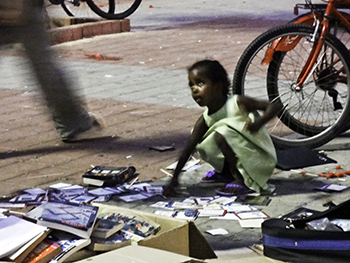
Her faded lime green dress and purple flip-flops evoke a basic poverty and she is dwarfed by other elements of the landscape that clearly exclude her: handsome bicycles parked on smooth streets of brick; an anonymous adult foot, striding briskly past.
Eloge Butera, 4L, took the photo during a three-week summer program at Hebrew University in Jerusalem, in which ten McGill Law students traveled to Israel in August to meet ten Hebrew U counterparts and to study issues of multicultural diversity and democratic citizenship.
To Butera, the photo is a powerful representation of “the intersection of modernity, cultural identity and the long path of transformation that all societies have to go through in order to preserve, promote and protect human rights.”
It is also one of the many instances over the course of the program where the McGill and Hebrew University students alike were confronted with the complex questions of globalization, conflicts of values, international norms and human rights.
“The program was very interestingly designed,” said 2L Farid Muttalib, “On the one hand, we spent a lot of time in class engaged in sometimes very theoretical discussions. But then we would also spend the equivalent amount of time outside the classroom, visiting the Israeli Supreme Court, local NGOs or different communities in Israel.”
The program comprised five courses addressing minorities and international law, social diversity, migration, economic regulation and discrimination. The field component included the aforementioned visit to South Tel Aviv, where students learned about the work of a non-profit organization dedicated to promoting the rights of Israel’s growing refugee and migrant worker population. The young girl captured in Butera’s photo speaks powerfully about their plight.
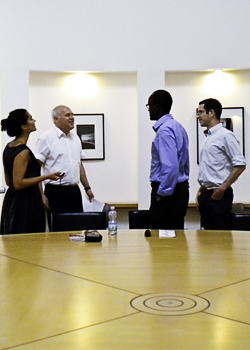
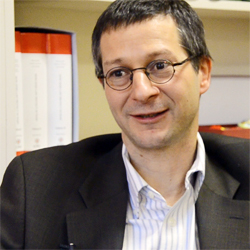
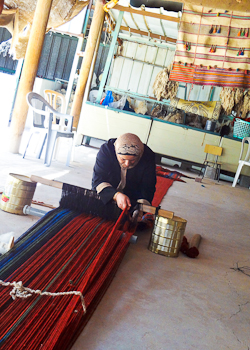
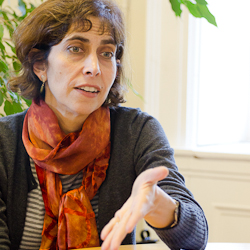
Discussions about the Israeli government’s practices and policies towards Palestinians generated much comment and some controversy prior to the students’ departure, with the McGill Daily calling for a boycott of ties with Hebrew University altogether. Upon their arrival, the students quickly discovered that the challenges and complexities of the situation could not be encompassed by political bombast.
“No command of the facts will permit anyone to give easy answers,” said 3L Will Colish in reflecting upon the course. “You are compelled to ask questions, and ask them intelligently.”
A talk by an Israeli official and a visit to Neve Shalom, a community located outside of Jerusalem where Israeli and Palestinian families live side-by-side, generated diverse and heated responses, Muttalib said. “But for the most part, the political discussions were very organic discussions that would arise when it made sense. They weren’t the focus of the program.”
“Whatever your opinion might be about the Israeli government practices and policies relating to the Palestinians, a boycott simply shuts down avenues for dialogue,” said program director and founder of McGill’s Centre for Human Rights and Legal Pluralism, René Provost.
“One of the very rewarding comments I got from the Israeli students was how much they were learning about their own country as a result of this program,” Provost said. “They learned a lot about Canada and of course the Canadians learned a lot about Israel, but the course also took the Israelis to parts of East Jerusalem and to Bedouin villages where they had never been, and where they encountered people that, as university students in Jerusalem, they wouldn’t normally encounter. I hope that we can do the same for Canadian participants next year when the program is held at McGill.”
Under blue skies, the students toured the verdant grounds of Neve Shalom and listened to two of its residents speak of their vision of Israel as a secular, binational state. Under a scorching sun in the windy Negev desert, the students watched Bedouin women operate traditional weaving looms and witnessed the destitute living conditions of those living in villages that did not have recognition by the Israeli government.
In Tel Aviv, they heard a Sudanese refugee speak about the rights, or lack thereof, of migrants and at the Israeli Supreme Court, they sat down for an informal round-table discussion with Supreme Court Justice Uzi Fogelman. In West Jerusalem, they took in the rich religious history of the land and in East Jerusalem, they learned about the lack of basic social services, such as garbage removal.
For Muttalib, one of the most memorable experiences of his trip was participating in the protests that were sweeping through Tel Aviv and Jerusalem during the students’ visit. These protests saw individuals from all cross-sections of society set up tents in public spaces to draw attention to and speak out against social injustices such as economic disparity and political marginalization.
Taking part in these demonstrations, well before the Occupy movement took off in North America and half a year into the Arab Spring, gave him privileged and immediate insight into how the law plays out in everyday life, Muttalib said.
“The students heard a range of voices, all of which was exposure to different ways of talking about Israel,” said Shauna Van Praagh, who, along with Provost and Alana Klein, made up the three McGill faculty members who participated in the program. “The experience was complex and, in a sense, everyone should engage critically with it… that was the whole point!”
“We all learned a lot about how you can engage with someone who has chosen to talk about something from a perspective that you don’t agree with,” she added. “I think one of the most striking aspects of the program is that, over the three weeks, the students became better speakers, but also, more importantly, better listeners.”
As part of her course on Laws and Identities, Shauna Van Praagh asked students to form pairs with a student from their counterpart university and submit two photos taken during the three weeks of the summer program. These photos had to highlight questions of diversity and identity discussed during the course and were to be accompanied by 100-word captions in Hebrew and in English (as well as in French and Arabic if so desired). The resulting photos and captions can be viewed in a PDF document by clicking on this link.
